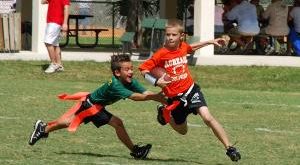Every situation differs, of course, but in general it is best to let your child have his or her own chance to make decisions about sports.
It is very important for parents to be supportive when it comes to their child’s sporting endeavors; however, becoming overbearing can make the sport no longer seem fun for the child. Many times, parents who played sports growing up push their children into playing the same sports that they enjoyed, meaning only to continue a family tradition. Unfortunately, sometimes the child would rather do something else, even if they do not say anything to their parent. Child athletes are often looking to make their parents proud, and what better way to do that than to play the sport that dear old mom or dad enjoyed?
Cory Zahradnik, former college football player and now a father himself, says parents should “be aware of how [their children are] performing and look at what needs to improve specifically.” It’s important to note whether or not the child is listening to constructive feedback; if not, it may be time to ask your child if there is something else they would rather do.
Many times parents blame the struggling child for not trying hard enough. Dr. Aimee C. Kimball, director of mental training for UPMC Sports Medicine, says blaming the child’s effort does not help the situation. “Most of the time they really are trying as hard as they can.”
Parents of child athletes need to be patient, especially with younger children just starting to play sports. They may need more direction and encouragement.
Zahradnik says the parent’s most common mistake in handling this situation is lack of patience. These impatient parents can be seen in the bleachers stewing because their son or daughter dropped the ball or missed a goal. At this point, the parent is no longer being supportive, but disobliging.
“Constructive feedback and encouragement,” is what Zahradnik recommends to parents of struggling youth athletes. “I think especially if the parents had athletic success themselves, they may not understand why their children cannot perform as well.”
A great way to help support your child in sports is to make time to practice with them in the back yard. Kids who are new to sports often need more hands-on help. Coach and high school gym teacher Julie Baccanti says if your child enjoys the sport, working with them—or finding someone with experience in that sport to work with them—can go a long way toward improving their game.
Be mindful, says Zahradnik, to, “Not just focus on what they’re doing wrong, but praise what they do right as well.”
If your child does decide he or she would rather be doing something else with their time, it is best not to just let them quit, at least not in the middle of a season.
“It is important for parents to teach their children life skills through sports,” Dr. Kimball says, pointing out that it is important to have a talk with your son or daughter if the idea of quitting becomes a possibility.
Children need to know that they have a responsibility to the team for a whole season and that they should honor that commitment, otherwise they may learn it is okay not to honor commitments in the future.
“At times you are going to struggle, but this is a commitment to see through to the end,” Kimball says. “There’s an exception for everything,” Zahradnik also said, “but if they made a commitment then they need to honor that commitment.”
Before allowing your child to quit, Zahradnik recommends having the child try different positions to see which one he or she has the most success with.
“It’s good to move around and see what you like.”
Baccanti agrees.
“I would never let them quit until the season is over, because you are teaching them that if things aren’t going right, it’s okay to just give up,” she said. “At the end of the season, if they really do not like the sport, I would let them be finished with that sport and help them to find something else they are interested in trying.”
Remember, too, that while the struggles may be seen on the field or on the court, the reasons behind the struggles may be mental.
“Often, when an athlete is struggling with performance, it tends to be more of a mental problem than a physical one,” says Dr. Kimball, who advises parents to “figure out their child’s mindset before performance.”
She recommends parents talk to their children about the mindset they approach the game with; if they can focus on what they do well it helps to gain control of the areas that they are struggling with.
At some point, it will become obvious—even to the child—that they may simply not be able to have success in a particular sport.
“I had one player continue to play throughout, knowing she would not get much playing time,” Baccanti recounts, “but she still just wanted to be part of the team. She just loved playing basketball.”
Players who struggle can certainly play recreationally, although as kids get older, sports tend to get more competitive, which often means tryouts – and cuts.
“I really enjoyed recreational basketball, but I didn’t make the team,” Zahradnik recalls. “I realized the other players were better and I gravitated toward football.”
He went on to have success playing football at the college level, offering proof that children who do not find success with one sport may find a lot of success with a completely different one.
When your child struggles in sports, it is best to be aware of your child’s performance, and identify skills they need to improve upon. Make some time to help them practice these skills, remembering to stay patient and not to blame the child. Give young children support and praise for their efforts. Encourage your child to try new positions or perhaps a new sport after the season is over if they did not find success with the first sport.
And remember, sports get continually more competitive as your child ages and starts middle school and high school, so sports will require a lot more time and energy to maintain the necessary skill level needed to make the team.
Most important of all, make sure your child is enjoying him or herself
 KidSports A Parents Guide for Young Athletes
KidSports A Parents Guide for Young Athletes



